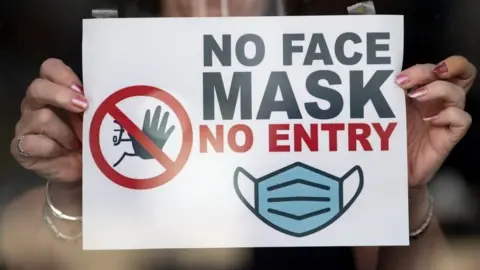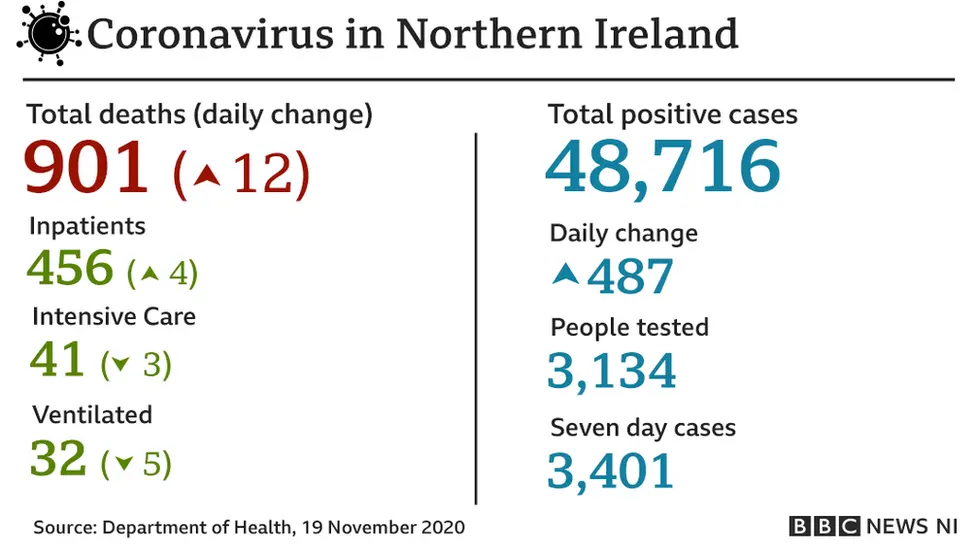Coronavirus: Talks continue to reach agreement on restrictions
 Getty Images
Getty ImagesStormont ministers are continuing to meet in a bid to reach agreement on further Covid-19 restrictions.
Health Minister Robin Swann had warned more interventions were necessary before the end of this month.
Otherwise, he said a full lockdown in mid-December would not be enough to stop hospital services being overwhelmed.
The executive has been considering advice from health officials throughout the afternoon.
It is thought discussions will continue into Thursday evening, with ministers taking a brief adjournment until 18:00 GMT.
It is believed that is to allow health officials to take some of the minister's advice and put it into formal recommendations.
Several Stormont sources said it appeared all the parties were "in the right space" to support Mr Swann's proposals, reported BBC News NI's Jayne McCormack.
The DUP, which previously opposed the extension of some restrictions, has indicated it may support recommendations this time - given the advice being presented by health officials.
Close-contact services, cafes and coffee shops are set to reopen this Friday but restrictions on pubs, restaurants and hotels will expire at midnight next Thursday.
It is understood the minister has also asked the executive to consider the possible introduction of local, legally enforceable travel restrictions.
Until now, the executive has only advised against "unnecessary travel".
Meanwhile, the Department of Health has said Northern Ireland will initially be in line for up to 4.35 million doses of vaccines when they are eventually made available.
Two of the leading vaccines - Pfizer and AstraZeneca - have completed their final trials and are seeking authorisation.
The Department of Health confirmed to the Press Association that NI would receive 1.5 million doses of the Pfizer vaccine, and 2.85 million doses of AstraZeneca.
It said this will be in line with allocations made through the Barnett Formula.
It is possible they could be available for use in the UK by the end of December.
On Thursday, the Department of Health confirmed 12 coronavirus-related deaths in the previous 24 hours, bringing the department's death toll to 901.

There were 487 new cases of the virus recorded.
There are also 456 people being treated in hospitals in Northern Ireland for Covid-19, with 41 in ICU and 32 on ventilators.
In the Republic of Ireland four further coronavirus-related deaths and 429 new cases were recorded on Wednesday.
The Irish Department for Health said there were 290 patients being treated in hospital, and there were 33 people in ICU.
There have been 15 additional hospitalisations in the past 24 hours.
Thursday's full meeting at Stormont is the first since last week's row over extending some regulations.
DUP MP Sir Jeffrey Donaldson said his party was focused on finding consensus and said Arlene Foster had "spent a lot of time this week talking to her fellow ministers, trying to get people back together"..
"If the infection rate is rising and the current restrictions are not working, we need to learn the lessons of that," he told BBC NI's Good Morning Ulster.


The marked change in tone from the DUP is certainly significant.
Just seven days ago, the party was the loudest advocate against more restrictions on hospitality, and Arlene Foster had insisted the regulations would fall away on 27 November.
The party's attitude to lockdown measures has changed, which senior figures put down to the rising rates of infection - something health officials had already warned of last week.
However it's thought the DUP wants more measures introduced as lockdown on its own does not appear to be doing enough.
The atmosphere around the executive table appears very different today, so far - with the potential that consensus could be reached by the five parties.
But we have been here before, and it could still take time before any final decision is reached.
If the executive does now reach agreement, some may wonder what the difficult events of last week were all about.

On Wednesday, Mr Swann said he would bring a range of options to ministers including restrictions and initiatives.
He said the measures were aimed at restricting the spread of Covid-19 ahead of Christmas.
NI's Chief Scientific Adviser Prof Ian Young has said the R-rate - the rate of transmission of the virus - in Northern Ireland is currently sitting at "around one", and has risen since schools reopened two weeks ago.
Sir Jeffrey said his party would "work with the health minister and other ministers in the executive to arrive at a consensus".
"I certainly hope we're not in a position where anyone has to use a veto in this situation and we're working closely with the health minister and with other ministers to arrive at a set of proposals that people can agree to on all sides," he added.
'Devastating'
Hospitality Ulster chief executive Colin Neill said not being able to open on 27 November would be "devastating" for businesses.
"If we are not open, the current funding does not save the businesses, and furlough is not free," he said.
But Dr Tom Black, chair of the British Medical Association (BMA) in NI, said easing restrictions now would see "us paying the price further down the road".
Millions of 'fast Covid-19 tests'
Meanwhile, Mr Swann has written to the UK government asking for four million fast-turnaround Covid-19 tests.
The Department of Health confirmed Mr Swann's request for the fast tests, which would allow Northern Ireland's entire population to be tested.
However, it is thought they would, if approved, more likely be used in a targeted way, by focusing on health workers or specific communities.
